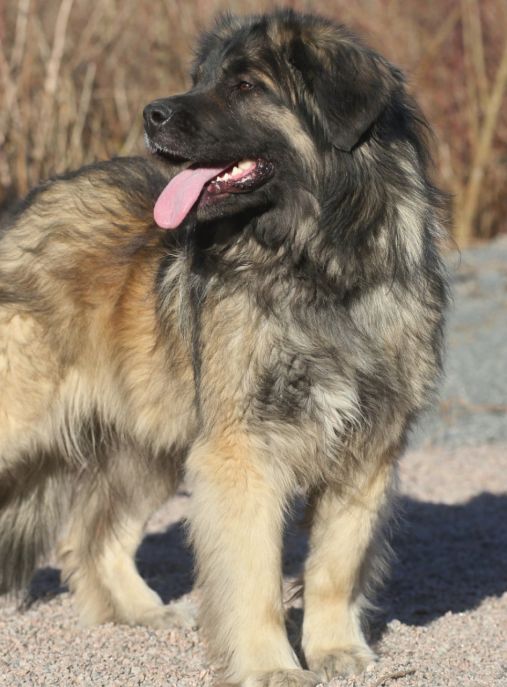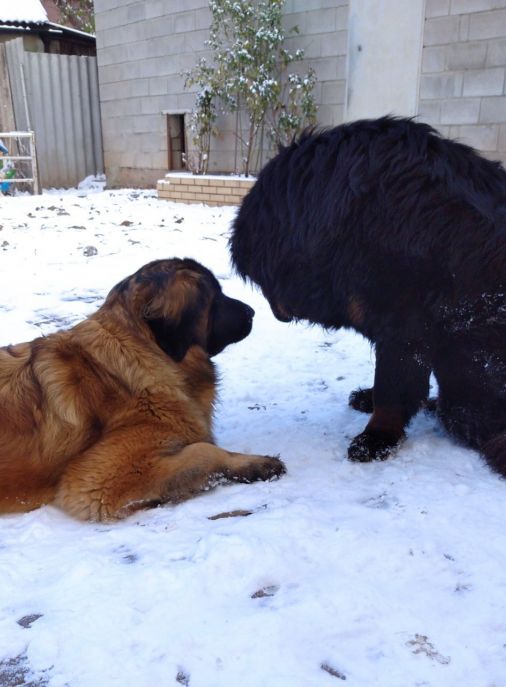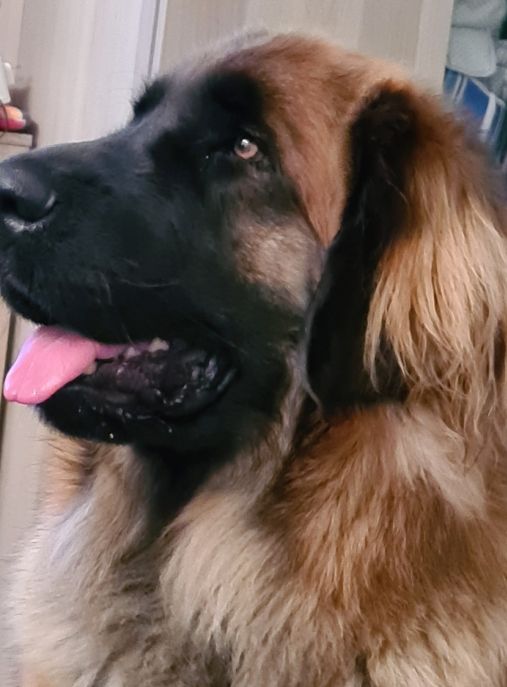The Leonberger is a majestic and powerful dog breed that captures the hearts of many with its regal appearance and gentle nature. Known for its lion-like mane and impressive size, the Leonberger is a breed that exudes strength and elegance. In this text, we will delve into the history, characteristics, and interesting facts about this remarkable breed.
Originating in Leonberg, Germany, during the mid-19th century, the Leonberger breed was developed by Heinrich Essig, a politician and dog breeder. Essig aimed to create a dog that resembled the lion on the town's crest, symbolizing strength, loyalty, and bravery. He achieved this by crossing various breeds, including the Saint Bernard, Newfoundland, and Great Pyrenees.
According to the FCI (Fédération Cynologique Internationale) typology, the Leonberger belongs to Group 2, Section 2.2, which includes Molossian-type mountain dogs. These dogs were historically used for guarding, drafting, and water rescue. The Leonberger's impressive size and strength make it well-suited for these tasks.
The Leonberger is a versatile breed that excels in various roles. They are excellent family companions, therapy dogs, and search and rescue dogs. Their gentle and patient nature makes them great with children, and their intelligence and trainability allow them to excel in obedience and agility competitions.
One of the defining characteristics of the Leonberger is its size. Males typically weigh between 110-170 pounds (50-77 kg), while females weigh between 90-140 pounds (41-64 kg). They stand at a height of 28-31.5 inches (71-80 cm) at the shoulder. Despite their large size, Leonbergers are known for their grace and agility.
The average life expectancy of a Leonberger is around 8-9 years, although some can live well into their early teens with proper care. Like many large breeds, Leonbergers are prone to certain health issues, including hip and elbow dysplasia, osteosarcoma, and heart conditions. Regular exercise, a balanced diet, and routine veterinary care are essential for maintaining their overall health and well-being.
The Leonberger's coat is another notable feature. It is thick, water-resistant, and comes in various colors, including lion-yellow, red, and sandy. The breed's double coat consists of a soft and dense undercoat, which provides insulation, and a longer, coarser outer coat that protects against the elements. Regular grooming is necessary to keep their coat clean and free from tangles.
Despite their imposing appearance, Leonbergers are known for their gentle and friendly nature. They are incredibly loyal and devoted to their families, making them excellent companions and protectors. Their calm and patient demeanor allows them to adapt well to various living situations, including apartments, as long as they receive sufficient exercise and mental stimulation.
Leonbergers are known for their love of water and are natural swimmers. Their webbed feet and muscular build make them excellent water rescue dogs. They have a strong instinct to protect and care for those in need, making them a valuable asset in emergency situations.
In conclusion, the Leonberger is a remarkable breed that combines strength, elegance, and a gentle nature. Developed in Germany, this breed has a rich history and is known for its versatility in various roles. From being a loyal family companion to excelling in search and rescue work, the Leonberger is a breed that embodies loyalty, bravery, and love. With proper care and attention, this majestic breed can bring joy and companionship to any household.
The Leonberger dog breed is known for its majestic appearance and gentle nature. These large and powerful dogs possess a unique combination of strength, intelligence, and loyalty. With their calm and friendly demeanor, Leonbergers make excellent family pets and are often referred to as "gentle giants."
One of the defining characteristics of Leonbergers is their friendly and affectionate nature. They are highly sociable dogs that thrive on human companionship. They are known to be excellent with children and are often described as patient and tolerant. Leonbergers are also known to be good with other animals, making them a great choice for multi-pet households.
Despite their large size, Leonbergers are not aggressive or dominant. They are generally calm and composed, making them well-suited for families with a relaxed lifestyle. However, they do possess a protective instinct and will readily defend their loved ones if they sense any threat. This makes them excellent watchdogs, as they are naturally alert and vigilant.
Leonbergers are intelligent dogs and are eager to please their owners. This makes them relatively easy to train, although they can be stubborn at times. Consistency, positive reinforcement, and early socialization are key to successfully training a Leonberger. They respond well to reward-based training methods and enjoy learning new tricks and commands.
Exercise is an important aspect of raising a Leonberger. While they are not overly energetic, they do require regular physical activity to keep them mentally and physically stimulated. Daily walks, playtime, and opportunities for socialization are essential for their well-being. However, it is important to avoid excessive exercise, especially during their growth phase, as their joints are still developing.
Grooming a Leonberger requires regular attention due to their thick double coat. They have a water-resistant outer coat and a dense undercoat, which helps protect them in various weather conditions. Regular brushing is necessary to prevent matting and to keep their coat healthy and shiny. During shedding seasons, which occur twice a year, more frequent brushing is required to manage the shedding.
Leonbergers are generally healthy dogs, but like any breed, they can be prone to certain health issues. Some common health concerns in Leonbergers include hip and elbow dysplasia, heart conditions, and certain types of cancer. Regular veterinary check-ups, a balanced diet, and maintaining a healthy weight are important for their overall well-being.
In conclusion, Leonbergers are gentle, loyal, and intelligent dogs that make wonderful family pets. Their friendly and affectionate nature, combined with their protective instincts, make them excellent companions and watchdogs. With proper training, socialization, and exercise, a Leonberger can thrive in a loving and caring environment.
The Leonberger is a majestic and gentle giant, known for its impressive size, strength, and friendly nature. Caring for a Leonberger requires attention to their specific needs to ensure their well-being and happiness. Here are some tips on how to care for dogs of this breed, including what to do and what not to do:
1. Exercise: Leonbergers are active dogs that require regular exercise to maintain a healthy weight and prevent boredom. Daily walks, playtime, and mental stimulation are essential. However, avoid excessive exercise during their growth phase to protect their developing joints.
2. Grooming: Leonbergers have a thick double coat that requires regular grooming to keep it clean and tangle-free. Brush their coat at least once or twice a week to remove loose hair and prevent matting. Pay extra attention during shedding seasons, as they tend to shed heavily. Regular nail trims, ear cleaning, and teeth brushing are also important.
3. Socialization: Leonbergers are social dogs that thrive on human companionship. Early socialization is crucial to ensure they grow up to be well-rounded and confident adults. Expose them to various people, animals, and environments from a young age to help them develop good social skills.
4. Training: Leonbergers are intelligent and eager to please, making them relatively easy to train. Start obedience training early, using positive reinforcement techniques such as treats and praise. Consistency, patience, and firmness are key to their success. Avoid harsh training methods or punishment, as it can damage their trust and confidence.
5. Health care: Regular veterinary check-ups are essential to monitor your Leonberger's overall health. Vaccinations, parasite prevention, and dental care should be part of their routine. Due to their large size, Leonbergers are prone to certain health issues like hip dysplasia, heart problems, and bloat. Regular exercise, a balanced diet, and maintaining a healthy weight can help minimize these risks.
6. Diet: Leonbergers have specific dietary needs due to their size and growth rate. Feed them a high-quality, balanced diet formulated for large breeds. Avoid overfeeding, as excess weight can put strain on their joints and increase the risk of health problems. Consult with your veterinarian to determine the appropriate portion sizes and feeding schedule.
7. Temperature control: Leonbergers have a thick coat that makes them prone to overheating. Ensure they have access to shade, fresh water, and a cool environment during hot weather. Avoid leaving them in hot cars or exercising them excessively in high temperatures.
8. Avoid excessive jumping: Due to their size and weight, Leonbergers are susceptible to joint and bone problems. Discourage excessive jumping, especially on hard surfaces, as it can cause injuries or exacerbate existing conditions.
9. Avoid long periods of isolation: Leonbergers thrive on human companionship and can suffer from separation anxiety if left alone for long periods. Provide them with mental stimulation, toys, and a comfortable space when you're away. Consider doggy daycare or a pet sitter if you're unable to spend enough time with them.
10. Love and attention: Above all, Leonbergers need love, attention, and a strong bond with their family. They are loyal and devoted dogs that thrive on affection. Spend quality time with them, provide plenty of cuddles, and make them feel like an integral part of your family.
Caring for a Leonberger requires commitment, time, and effort, but the rewards of having such a magnificent companion are immeasurable. By following these tips and providing them with the care they deserve, you'll ensure a happy and healthy life for your beloved Leonberger.
The common color of Leonberger dogs is a stunning combination of rich, warm hues that exude elegance and grace. Their coat is characterized by a beautiful blend of shades, creating a harmonious symphony of colors that captivate the eye.
At first glance, the Leonberger's coat appears to be a majestic golden hue, reminiscent of the sun's radiant glow. This golden base color is often described as a lustrous, deep shade that is both captivating and regal. It is as if the dog's coat has been kissed by the sun, resulting in a breathtaking display of warmth and radiance.
As you observe the Leonberger more closely, you will notice that their coat is adorned with darker accents, adding depth and dimension to their overall appearance. These darker shades are typically seen in the form of auburn or reddish-brown highlights, which create a striking contrast against the golden backdrop. These highlights are often concentrated around the ears, face, and tail, further enhancing the dog's facial features and overall allure.
The Leonberger's coat is not only visually appealing but also incredibly luxurious to the touch. It is thick and dense, providing protection against various weather conditions. The texture of their fur is soft and silky, inviting you to run your fingers through it and revel in its velvety smoothness.
In addition to their stunning coat color, Leonbergers often exhibit a black mask that adds a touch of mystery and intrigue to their appearance. This mask typically covers the dog's muzzle, accentuating their expressive eyes and giving them an air of wisdom and intelligence.
As with any breed, variations in coat color can occur within the Leonberger population. Some individuals may have a slightly lighter or darker shade of gold, while others may display more pronounced or subtle highlights. However, the overall essence of the Leonberger's coat color remains consistent – a captivating blend of golden hues with darker accents that exudes beauty and sophistication.
In conclusion, the common color of Leonberger dogs is a mesmerizing blend of golden tones, enriched by darker highlights and complemented by a black mask. This unique combination creates a visually striking appearance that is both regal and captivating. Whether basking in the sunlight or standing proudly in the rain, the Leonberger's coat color is a testament to their majestic nature and undeniable beauty.
The Leonberger dog breed is known for its majestic appearance, gentle nature, and impressive size. These dogs are generally healthy and robust, but like any other breed, they can be prone to certain health issues. To ensure the well-being of your Leonberger, it is essential to understand the common diseases that affect them and provide appropriate care.
One of the most prevalent health concerns in Leonbergers is hip dysplasia. This condition occurs when the hip joint doesn't develop properly, leading to discomfort, lameness, and arthritis. Responsible breeders conduct hip evaluations on their breeding dogs to minimize the risk of passing on this genetic condition. Regular exercise, a balanced diet, and maintaining a healthy weight can help manage hip dysplasia in Leonbergers.
Another common health issue in this breed is osteosarcoma, a type of bone cancer. Leonbergers are more susceptible to this disease compared to other breeds. Early detection is crucial for successful treatment, so regular veterinary check-ups and monitoring any signs of lameness or swelling are essential. Treatment options may include surgery, chemotherapy, or a combination of both.
Gastric dilatation-volvulus (GDV), commonly known as bloat, is a life-threatening condition that can affect Leonbergers. It occurs when the stomach fills with gas and twists, leading to a blockage of blood flow and potential organ damage. Symptoms include restlessness, unproductive retching, distended abdomen, and rapid breathing. Immediate veterinary attention is necessary if bloat is suspected. To reduce the risk of GDV, feed your Leonberger smaller, more frequent meals, avoid vigorous exercise before and after meals, and use elevated feeding bowls.
Leonbergers are also prone to certain eye conditions, including cataracts, entropion, and progressive retinal atrophy (PRA). Regular eye examinations by a veterinary ophthalmologist can help detect these issues early on. Cataracts may require surgical intervention, while entropion can often be managed with medication or corrective surgery. PRA, a degenerative disease leading to vision loss, has no cure, but genetic testing can help identify carriers and prevent its spread through breeding.
Obesity is a concern for Leonbergers, as their large size can put additional strain on their joints and overall health. A balanced diet, portion control, and regular exercise are crucial to maintaining a healthy weight. Avoid overfeeding and provide a diet rich in high-quality protein, healthy fats, and appropriate carbohydrates.
Regular grooming is essential for Leonbergers, as their thick double coat requires frequent brushing to prevent matting and to remove loose hair. This breed tends to shed heavily, especially during seasonal changes. Additionally, regular dental care, including brushing their teeth and providing dental chews, can help prevent periodontal disease and maintain good oral health.
Lastly, providing mental stimulation and socialization is vital for the overall well-being of Leonbergers. These intelligent dogs thrive on human companionship and enjoy participating in various activities such as obedience training, agility, and swimming. Mental and physical exercise not only keeps them physically fit but also helps prevent behavioral issues that can arise from boredom or lack of stimulation.
In conclusion, while Leonbergers are generally healthy dogs, they can be prone to certain health conditions. Regular veterinary check-ups, genetic testing, a balanced diet, appropriate exercise, and proper grooming are essential for maintaining their overall health and well-being. By being proactive in their care, you can ensure that your Leonberger lives a long, happy, and healthy life.
The Leonberger is a majestic and gentle giant, known for its impressive size and friendly nature. As a large breed, proper nutrition is crucial to ensure their overall health and well-being. A well-balanced diet is essential to support their growth, maintain a healthy weight, and prevent common health issues associated with large dogs. In this text, we will delve into the nutrition requirements of Leonberger dogs, offering advice on what and how to feed them, as well as highlighting foods to avoid.
Protein is a vital component of a Leonberger's diet, as it supports muscle development and repair. High-quality animal-based proteins, such as chicken, turkey, beef, and fish, should form the foundation of their meals. Look for dog food that lists these proteins as the primary ingredients, avoiding products that contain excessive fillers or meat by-products.
Fat is another essential nutrient for Leonbergers, providing them with a concentrated source of energy. However, it is important to strike a balance, as excessive fat intake can lead to obesity. Opt for dog food that contains moderate levels of healthy fats, such as omega-3 and omega-6 fatty acids, which promote a healthy coat and skin. Fish oil and flaxseed are excellent sources of these beneficial fats.
Carbohydrates are a valuable energy source for Leonbergers, but it is crucial to choose complex carbohydrates that release energy slowly. Whole grains like brown rice, oats, and barley are excellent choices, as they provide essential fiber, vitamins, and minerals. Avoid dog foods that rely heavily on simple carbohydrates, such as corn or wheat, as these can cause digestive issues and contribute to weight gain.
Fruits and vegetables are essential for providing vital nutrients, antioxidants, and fiber. Incorporate a variety of these into your Leonberger's diet, including carrots, sweet potatoes, spinach, blueberries, and apples. However, be cautious with certain fruits like grapes and raisins, as they can be toxic to dogs. Always remove any seeds or pits from fruits before feeding them to your pet.
Feeding Leonbergers should be done in controlled portions to prevent overeating and obesity. Due to their large size, it is recommended to divide their daily food intake into two or three meals. This helps prevent bloating, a condition that can be dangerous for large breeds. Consult with your veterinarian to determine the appropriate portion sizes based on your dog's age, weight, and activity level.
While it may be tempting to share human food with your Leonberger, it is important to avoid certain foods that can be toxic or harmful to dogs. These include chocolate, caffeine, onions, garlic, grapes, raisins, avocados, and foods high in salt or sugar. Additionally, be cautious with bones, as they can splinter and cause choking or internal injuries.
Proper hydration is crucial for Leonbergers, especially during hot weather or periods of increased activity. Always ensure your dog has access to fresh, clean water throughout the day. Monitor their water intake and consult your veterinarian if you notice any significant changes.
In conclusion, a well-balanced diet is essential for the health and longevity of Leonberger dogs. Focus on high-quality proteins, moderate levels of healthy fats, complex carbohydrates, and a variety of fruits and vegetables. Avoid foods that are toxic or high in salt, sugar, or unhealthy fats. By providing the right nutrition and portion control, you can help your Leonberger thrive and enjoy a happy and healthy life.



















